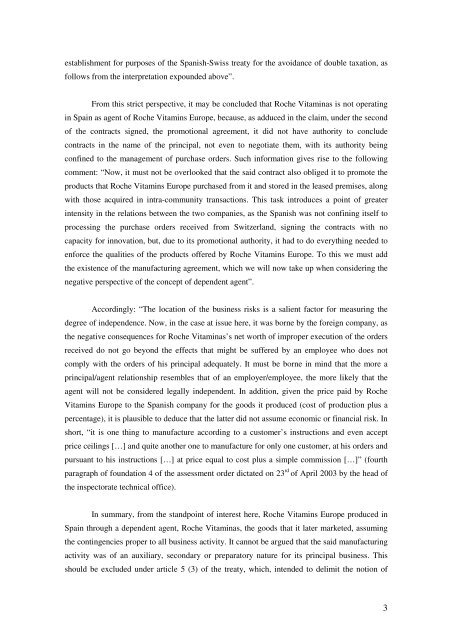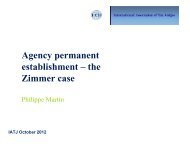Agency Permanent Establishment - Spain - Iatj.net
Agency Permanent Establishment - Spain - Iatj.net
Agency Permanent Establishment - Spain - Iatj.net
- No tags were found...
Create successful ePaper yourself
Turn your PDF publications into a flip-book with our unique Google optimized e-Paper software.
establishment for purposes of the Spanish-Swiss treaty for the avoidance of double taxation, asfollows from the interpretation expounded above”.From this strict perspective, it may be concluded that Roche Vitaminas is not operatingin <strong>Spain</strong> as agent of Roche Vitamins Europe, because, as adduced in the claim, under the secondof the contracts signed, the promotional agreement, it did not have authority to concludecontracts in the name of the principal, not even to negotiate them, with its authority beingconfined to the management of purchase orders. Such information gives rise to the followingcomment: “Now, it must not be overlooked that the said contract also obliged it to promote theproducts that Roche Vitamins Europe purchased from it and stored in the leased premises, alongwith those acquired in intra-community transactions. This task introduces a point of greaterintensity in the relations between the two companies, as the Spanish was not confining itself toprocessing the purchase orders received from Switzerland, signing the contracts with nocapacity for innovation, but, due to its promotional authority, it had to do everything needed toenforce the qualities of the products offered by Roche Vitamins Europe. To this we must addthe existence of the manufacturing agreement, which we will now take up when considering thenegative perspective of the concept of dependent agent”.Accordingly: “The location of the business risks is a salient factor for measuring thedegree of independence. Now, in the case at issue here, it was borne by the foreign company, asthe negative consequences for Roche Vitaminas’s <strong>net</strong> worth of improper execution of the ordersreceived do not go beyond the effects that might be suffered by an employee who does notcomply with the orders of his principal adequately. It must be borne in mind that the more aprincipal/agent relationship resembles that of an employer/employee, the more likely that theagent will not be considered legally independent. In addition, given the price paid by RocheVitamins Europe to the Spanish company for the goods it produced (cost of production plus apercentage), it is plausible to deduce that the latter did not assume economic or financial risk. Inshort, “it is one thing to manufacture according to a customer’s instructions and even acceptprice ceilings […] and quite another one to manufacture for only one customer, at his orders andpursuant to his instructions […] at price equal to cost plus a simple commission […]” (fourthparagraph of foundation 4 of the assessment order dictated on 23 rd of April 2003 by the head ofthe inspectorate technical office).In summary, from the standpoint of interest here, Roche Vitamins Europe produced in<strong>Spain</strong> through a dependent agent, Roche Vitaminas, the goods that it later marketed, assumingthe contingencies proper to all business activity. It cannot be argued that the said manufacturingactivity was of an auxiliary, secondary or preparatory nature for its principal business. Thisshould be excluded under article 5 (3) of the treaty, which, intended to delimit the notion of3





